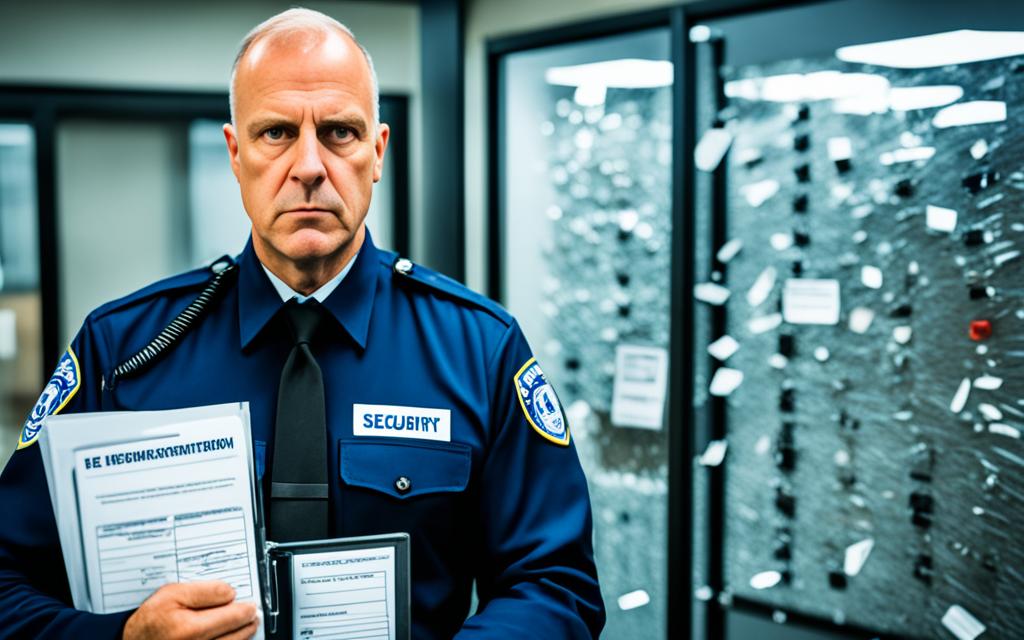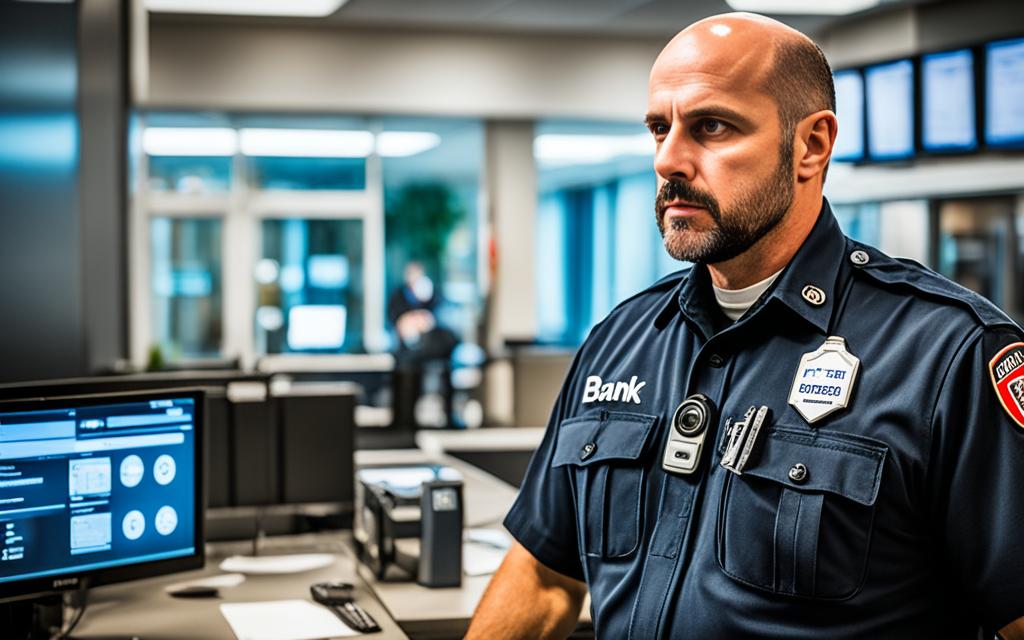Welcome to the comprehensive guide on effective emergency response for bank security guards. In today’s unpredictable world, crisis management and emergency response skills are crucial for ensuring the safety and security of both employees and customers. This guide will equip bank security guards with the strategies and techniques needed to handle crisis situations efficiently and effectively.
In the fast-paced banking environment, where unexpected events can arise at any moment, it is essential for security guards to be prepared for various emergencies. From natural disasters to security breaches, having a well-designed crisis communication plan and the ability to respond promptly can make all the difference in mitigating the impact.
Throughout this guide, we will explore the key aspects of crisis management, including crisis preparedness, crisis leadership, crisis training, and crisis communication. By understanding and implementing these strategies, bank security guards can enhance their emergency response capabilities and contribute to a safer banking environment for all.
Key Takeaways:
- Crisis management is essential for bank security guards to handle emergencies efficiently.
- A well-designed crisis communication plan is crucial in ensuring effective information flow during crisis situations.
- Crisis preparedness involves creating a crisis response strategy and establishing a crisis preparedness protocol.
- Crisis leadership techniques, such as decision-making and coordination, are key for effective crisis management.
- Crisis training and simulation exercises help enhance the emergency response capabilities of bank security guards.
Crisis Preparedness: Key Strategies for Bank Security Guards
In today’s dynamic environment, crisis preparedness is essential for bank security guards to effectively mitigate potential crises and ensure the safety of employees and customers. By implementing proactive measures such as crisis planning, crisis mitigation, and a crisis preparedness protocol, security guards can be well-equipped to handle emergency situations.
Create a Crisis Communication Plan
An integral part of crisis preparedness is the development of a comprehensive crisis communication plan. This plan outlines the procedures and channels through which crucial information is disseminated during crisis situations. By having a well-defined plan in place, bank security guards can effectively coordinate with different stakeholders and ensure a swift and organized response to crises.
Develop a Crisis Response Strategy
Alongside a crisis communication plan, it is crucial for bank security guards to develop a crisis response strategy. This strategy includes clear guidelines on how to address various crisis scenarios, empowering security guards to make informed decisions and take appropriate actions. By having a well-articulated response strategy, security guards can confidently navigate through crisis situations, minimizing potential risks and ensuring a swift resolution.
Establish a Crisis Preparedness Protocol
A crisis preparedness protocol serves as a framework for bank security guards to follow during emergency situations. This protocol encompasses a set of standard operating procedures and guidelines that security guards can refer to when facing crises. By establishing a robust protocol, security guards can ensure consistency and efficiency in their crisis response, facilitating a timely and effective resolution.
“Effective crisis preparedness is the foundation for successful crisis management. By proactively planning, mitigating risks, and establishing clear protocols, bank security guards can swiftly respond to crises, safeguarding the well-being of all stakeholders.” – Security Expert
By prioritizing crisis preparedness through crisis planning, crisis mitigation, and the establishment of a crisis preparedness protocol, bank security guards can confidently navigate through any emergency situation. It is essential for security personnel to stay updated on industry best practices and undergo regular training to ensure their preparedness for evolving crisis scenarios.

Crisis Leadership: Techniques for Bank Security Guards
In times of crisis, effective leadership plays a crucial role in guiding bank security guards towards a successful resolution. Crisis leadership involves utilizing a range of techniques that are instrumental in decision-making, communication, coordination, and crisis recovery actions.
Technique 1: Decisive Decision-Making
One of the key crisis leadership techniques is making decisive decisions in high-pressure situations. Bank security guards must possess the ability to assess critical situations swiftly and make informed judgments. This entails analyzing available information, evaluating potential outcomes, and taking swift action to mitigate the crisis.
Technique 2: Effective Communication
Clear and effective communication is vital in crisis situations. Bank security guards must be adept at conveying instructions, relaying essential information, and coordinating responses with other team members and relevant stakeholders. Open and transparent communication channels facilitate a coordinated and efficient crisis response.
Technique 3: Efficient Coordination
During a crisis, it is imperative for bank security guards to coordinate activities seamlessly. This involves delegating tasks, assigning responsibilities, and ensuring smooth cooperation among team members. Effective coordination fosters synergy within the crisis management team and maximizes the efficiency of crisis response efforts.
Technique 4: Crisis Recovery Actions
In addition to immediate crisis response, crisis leadership also entails implementing actions to aid in crisis recovery. Bank security guards should proactively identify steps to restore normalcy, such as conducting post-crisis evaluations, implementing preventive measures, and collaborating with relevant authorities to prevent future crises.
“Crisis leadership requires a combination of quick thinking, effective communication, and efficient coordination. By employing these techniques, bank security guards can effectively navigate crisis situations and facilitate a successful resolution.”
By honing these crisis leadership techniques, bank security guards can enhance their ability to handle crisis situations with confidence, decisiveness, and effectiveness. Through proactive decision-making, clear communication, efficient coordination, and crisis recovery actions, they can play a pivotal role in ensuring the safety and security of bank personnel, customers, and assets.

Crisis Training and Simulation Exercises for Bank Security Guards
In order to effectively respond to crisis situations, bank security guards must undergo comprehensive crisis training programs and engage in regular crisis simulation exercises. These initiatives play a crucial role in preparing guards to handle various emergency scenarios with confidence and competence.
Implementing a crisis training program equips bank security guards with the necessary knowledge and skills to navigate through challenging circumstances. The program should cover a wide range of topics, including crisis response protocols, communication strategies, risk assessment techniques, and crowd management tactics. By participating in such programs, guards can develop a solid foundation of crisis management principles and best practices.
One of the most effective ways to reinforce crisis training is through the use of simulation exercises. These exercises create a controlled environment that closely resembles real-life crisis situations, allowing guards to apply their training in a practical setting. Through realistic scenarios, guards can practice decision-making, communication, and teamwork under pressure.
By simulating crisis scenarios, bank security guards can hone their abilities to assess situations quickly, make critical decisions, and effectively coordinate emergency responses. This hands-on experience can significantly enhance their confidence and readiness to handle crises in an efficient manner.
During crisis simulation exercises, guards can identify any gaps in their knowledge or skills, enabling them to address and overcome these deficiencies. These exercises also provide an opportunity to collaborate and coordinate with other security personnel and relevant stakeholders, fostering a sense of teamwork and a shared understanding of crisis response protocols.
Tips for Effective Training and Simulation:
- Ensure that the crisis training program is comprehensive and covers various aspects of crisis management.
- Include realistic and diverse simulation scenarios that reflect potential crisis situations specific to the banking industry.
- Encourage active participation and engagement from all guards during training and simulation exercises.
- Provide constructive feedback and debrief sessions after each simulation exercise to identify areas for improvement.
- Regularly update and refine the crisis training program and simulation scenarios to align with evolving security threats and industry best practices.
By prioritizing crisis training and simulation exercises, bank security guards can develop the skills and confidence needed to effectively respond to emergencies. This proactive approach to crisis preparedness ensures a safer and more secure environment for banks, their employees, and their customers.
Crisis Communication: Ensuring Effective Information Flow
In times of crisis, effective communication is essential for bank security guards to handle situations efficiently and maintain public trust. Implementing a well-defined crisis communication plan and a crisis response plan is crucial for seamless information flow and timely decision-making.
Having a crisis communication plan in place enables bank security guards to establish clear communication channels and protocols, ensuring that relevant information reaches the right individuals promptly. This plan should outline key communication roles and responsibilities, contact lists, and guidelines for internal and external communication.
A crisis response plan complements the crisis communication plan by providing a structured approach to handling crisis situations. It encompasses specific actions and strategies tailored to different types of crises, ensuring a coordinated and effective response. This plan should include predefined crisis scenarios, escalation procedures, and steps for activating communication channels.
During a crisis, communication challenges may arise due to various factors such as high-stress levels, time sensitivity, and the need for confidentiality. It is essential for bank security guards to be prepared to handle these challenges effectively. They should prioritize clarity, accuracy, and consistency in their communication efforts while adapting their messaging to different stakeholders and media platforms.
“Clear communication during a crisis is crucial for building trust and instilling confidence in both internal and external stakeholders. It allows for the timely dissemination of critical information, minimizing confusion and preventing the spread of misinformation.”
Guidelines for Effective Crisis Communication
- Stay Calm and Composed: Maintain a calm and composed demeanor while conveying information, inspiring confidence, and reassuring stakeholders.
- Be Transparent and Honest: Provide accurate and timely information, avoiding speculations or false assurances that may damage credibility.
- Choose the Right Channels: Utilize a mix of communication channels, such as email, phone, social media, and press releases, to reach different audiences effectively.
- Adapt the Message: Tailor the messaging to the specific needs and concerns of different stakeholder groups, ensuring relevancy and empathy.
- Establish Key Spokespersons: Designate trained individuals to serve as primary communication contacts, ensuring consistent and reliable messaging.
- Monitor and Respond: Continuously monitor media and social media channels for updates, feedback, and questions, and respond promptly and appropriately.
By following these guidelines and leveraging their crisis communication plan and crisis response plan, bank security guards can navigate crisis situations effectively, maintain trust and confidence, and protect the reputation of the organization.
| Benefits of Effective Crisis Communication | Challenges Addressed |
|---|---|
| Ensures timely and accurate information dissemination | Minimizes confusion and prevents the spread of misinformation |
| Inspires confidence and trust in stakeholders | Manages reputational risks and protects the organization’s image |
| Promotes a coordinated and effective crisis response | Avoids communication breakdowns and facilitates decision-making |
Effective crisis communication is paramount in ensuring that banks and their security guards manage crises successfully. By implementing a crisis communication plan and a crisis response plan, security guards can establish clear communication channels, adapt their messaging, and address challenges promptly. Following guidelines for effective crisis communication enhances trust, fosters timely information dissemination, and protects the reputation of the organization.
Conclusion
In conclusion, effective crisis management is of utmost importance for bank security guards. The ability to respond swiftly and efficiently during emergencies can make a significant difference in minimizing potential damages and ensuring the safety of bank staff and customers.
Throughout this article, we have discussed key strategies and techniques for crisis preparedness, crisis leadership, crisis training, and crisis communication. By implementing these strategies and embracing proactive measures, bank security guards can enhance their emergency response capabilities and be better equipped to handle crisis situations.
Remember, crisis management requires a comprehensive approach that includes creating a crisis communication plan, developing a crisis response strategy, establishing a crisis preparedness protocol, providing ongoing training, and ensuring effective information flow. Putting these measures in place will enable bank security guards to act promptly, make informed decisions, and communicate effectively during high-stress situations.
In conclusion, prioritizing crisis management as a core aspect of bank security guard operations is crucial for maintaining a safe and secure environment. Be proactive, stay prepared, and implement the strategies outlined in this article to ensure that your bank’s emergency response capabilities are robust and dependable.
FAQ
What is crisis management?
Crisis management refers to the process of handling and mitigating crises or emergency situations within an organization. It involves planning, preparation, response, and recovery actions to effectively navigate through a crisis and minimize its impact.
Why is emergency response important for bank security guards?
Emergency response is crucial for bank security guards as they play a vital role in maintaining the safety and security of the bank and its occupants. An effective emergency response ensures timely and organized actions to protect lives, assets, and reputation during crisis situations.
What is crisis communication?
Crisis communication refers to the process of sharing timely, accurate, and relevant information during a crisis or emergency situation. It involves establishing a crisis communication plan, managing communication channels, and effectively disseminating information to stakeholders and the public.
How can bank security guards prepare for a crisis?
Bank security guards can prepare for a crisis by creating a crisis communication plan, engaging in crisis planning and mitigation strategies, establishing a crisis preparedness protocol, and conducting regular training and simulation exercises to improve their skills and readiness.
What is crisis leadership, and why is it important?
Crisis leadership refers to the ability to effectively lead and make critical decisions during a crisis. It involves coordinating response efforts, providing clear directions, maintaining calmness, and inspiring confidence in others. Crisis leadership is crucial for bank security guards to navigate through crises and ensure a swift recovery.
How should bank security guards handle crisis recovery?
Bank security guards should take proactive actions for crisis recovery by assessing damages, implementing necessary security measures, facilitating the return to normal operations, and conducting post-crisis evaluations to identify areas for improvement and prevent future crises.
Why is crisis training important for bank security guards?
Crisis training is essential for bank security guards as it helps them develop the necessary skills, knowledge, and confidence to handle crisis situations effectively. It involves implementing a comprehensive crisis training program and conducting regular simulation exercises to improve readiness and decision-making abilities.
What are the key components of a crisis communication plan?
A crisis communication plan typically includes the identification of key stakeholders, establishment of communication protocols and channels, development of pre-approved messages, creation of a crisis response team, and guidelines for monitoring and adapting communication strategies as the crisis unfolds.
How can bank security guards ensure effective information flow during a crisis?
Bank security guards can ensure effective information flow during a crisis by establishing clear communication channels, regularly updating stakeholders, utilizing technology for real-time updates, maintaining transparency, and addressing concerns and inquiries promptly and accurately.
What are some common challenges in crisis communication for bank security guards?
Common challenges in crisis communication for bank security guards include managing competing priorities, addressing misinformation or rumors, dealing with high-stress environments, coordinating communication across various departments, and adapting to dynamic situations that frequently arise during crises.


